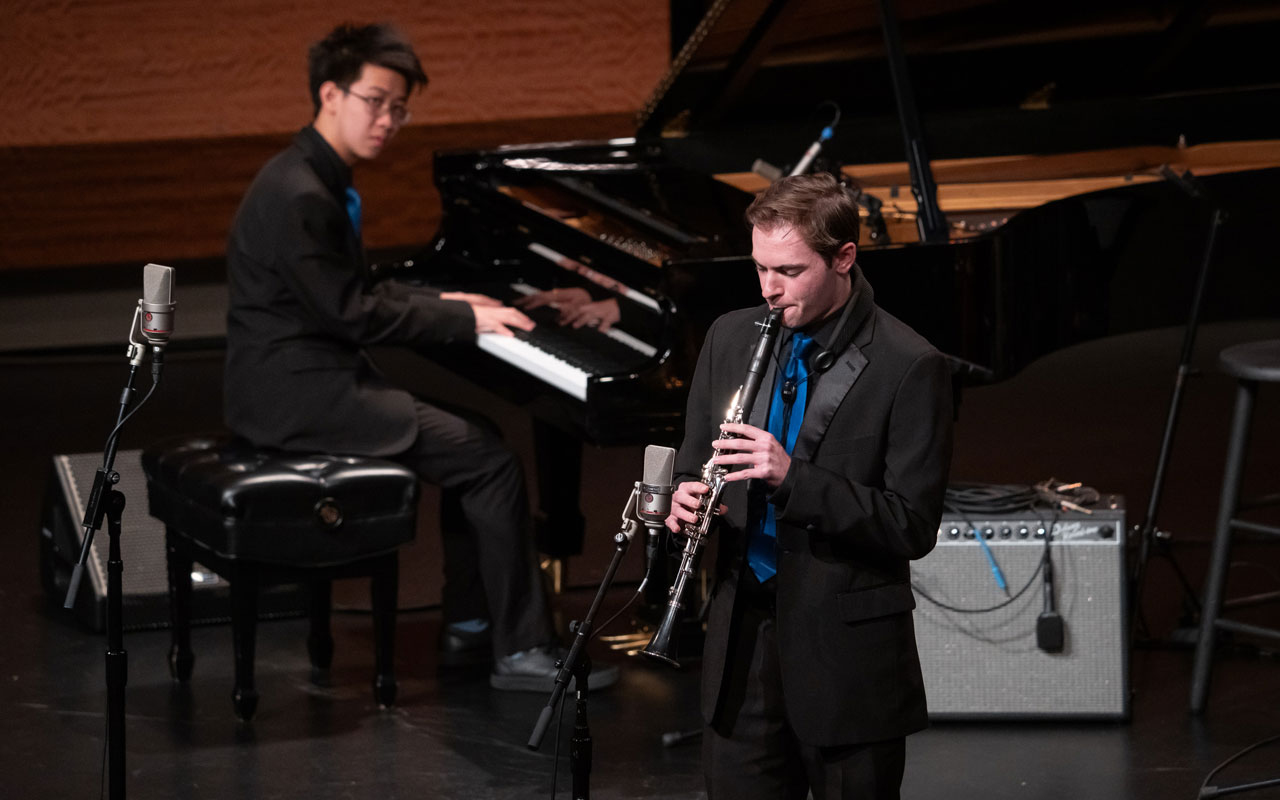
Bothell High School Jazz Band directed by Philip Dean. Photo by Gilberto Tadday, Jazz at Lincoln Center
It’s almost a cliché at this point to note that the PNW has one of the highest concentrations of high school jazz talent in the U.S. And, since 1996, the proving ground for top-tier high school jazz has been Jazz at Lincoln Center’s (JALC) Essentially Ellington(EE) festival.
Since about 2002, Seattle bands have been fixtures at the EE competition, with over a dozen area schools competing in the festival. This year’s lineup includes Garfield, Roosevelt, Bothell, and Mountlake Terrace High Schools.
Prior to the 2025 edition, fifteen bands competed each year. For the 30th anniversary, festival producers doubled the number of participating bands to 30 and eliminated a cap on including more than three bands from any region.
“Someone in the office asked, ‘Are we just going to end up with 15 bands from Seattle?’” Todd Stoll, vice president of education at JALC, laughs at the prospect, though it’s an apt question. “The strongest high school jazz band tradition in America is in Seattle. There’s something in the water there!”
The lineage of the PNW high school jazz ecosystem is deep, and backed by crew of dedicated and supportive educators who have contributed in myriad ways over the years. Following in the footsteps of the legendary Clarence Acox (who retired in 2019) didn’t faze Garfield’s Jared Sessink. Garfield has been accepted into EE four times on Sessink’s watch, so it’s safe to say things are going well. “Walking into a program that has a lot of institutional history, it really just comes down to your strength as an educator and being a strong organizer.”
Roosevelt’s Hannah Mowry also hit the ground running, following Scott Brown’s tenure from 1984 to 2022. “I‘m very intentional about the legacy of the program [also a four-time winner], and certainly the reverence that I and everyone in the jazz education community holds for Scott Brown. I try not to lose sight of the fact that, yes, we have a history, but my number one job is to serve the students in front of me.”
Matt Simmons, at Bothell for 22 years with four appearances at EE, and Darin Faul at Mountlake Terrace for 27 years, making their 10th appearance, are both building on their own long traditions. While trips to EE comprise the glitz and glamor side of the equation, the gritty, daily work of keeping these bands running is another story.
“I also have a full-time job, so I teach before school first period,” says Faul, adding, “It’s harder than it’s ever been. Budget reductions are crippling for us. I just try to find a way and you could say that jazz has taught me: you have to improvise.”
The work pays off, as Simmons adds, “Events like Ellington really give wide visibility to the amazing level these kids play and collaborate at, and why it’s important to support that.”
The challenges facing our nation’s democratic ideals are frequent themes that Wynton Marsalis, founder of Essentially Ellington, has explored as both a musician and educator. Issues of racial justice are fertile educational topics that students encounter at EE.
Faul’s bands have always touched on the issues of race and socioeconomics as a part of their studies, and he‘s seen societal changes in recent years.
“Many people are more aware of the challenges African Americans face than they were prior to George Floyd. That’s incredibly profound, I think, and it’s beneficial for students to look at Ellington’s music through that lens, too.”
Equity and inclusion questions centered on gender, tied in with jazz’s #MeToo stirrings in recent years, have created an imperative to draw more female participation into the music. “That’s a big conversation in the PNW,” notes Sessink. Headway is being made, but it’s not linear, or steady.
Mowry is cautiously optimistic, saying, “The general trajectory of progress is up.” She has created an inclusivity program at Roosevelt focusing on female and non-binary kids, where older students mentor younger ones. Last year, she initiated a pilot version at EE and plans to expand it this year.
“I’m in touch with other female directors this year to see if we can get more kids involved. Hopefully, we can attract some musician mentors like Alexa Tarantino from JALC.” [Tarantino is a saxophonist who recently joined the Orchestra as its sole full-time female member].
For Stoll, the JALC mission drives this American project forward, and in the end, the music speaks for itself. “This is the highest level of achievement that you’re going to see in young people in the arts. The music, the community, and our country all deserve this. It’s a great celebration of the things that are the best of America.”
Mowry sums it up: “I think the world needs these kids. I think we need their art. They know how to make the world better, and we should probably listen.”
Essentially Ellington festival events, including the final concert featuring the top-placing bands and the Jazz at Lincoln Center Orchestra, will stream live May 7-11 on jazzlive.com.
For more information about the EE program, visit jazz.org/education.
Additional Readings:
Kelly B. Clingan, Jazz Education Network, “Jazz Band: Where are the Girls?”
Alexa Peters, Cascade PBS, “Why is jazz essential in Seattle? Ask Wynton Marsalis”